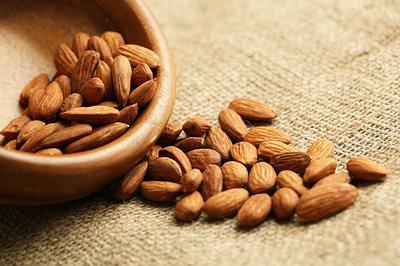1. Honey
Honey is useful in treating sleep apnea. Its anti-inflammatory properties help reduce swelling around the throat area that can obstruct airways. In addition, it lubricates the throat to prevent snoring, one of the most common symptoms of sleep apnea.Honey also promotes sleep and relaxation. Moreover, it helps maintain healthy body weight and prevent obesity. Losing weight is an important step for the treatment of sleep apnea.
- Add 1 tablespoon of raw honey to a glass of warm water and drink it daily before going to bed.
- Another option is to mix 1 teaspoon each of honey and black pepper powder in a glass of warm water. Sip it slowly before going to bed.
- To lose weight, drink a glass of warm water with 1 tablespoon of honey and the juice of ½ lemon on an empty stomach daily in the morning.
2. Chamomile
Another effective herbal treatment for sleep apnea is chamomile. The herb contains chemical compounds that can relax muscles and nerves, cause sedation and promote sleepiness. In addition, its anti-inflammatory effects can help get rid of obstruction of the airways that cause snoring.- Add 2 teaspoons of dried chamomile to a cup of hot water. Cover and steep for 5 minutes. Strain, then add a little honey and a pinch of cinnamon powder. Drink this tea 1 hour before going to bed daily.
- You can also prepare a massage oil with one part chamomile oil and two parts olive oil. Massage your neck with this oil a few times daily.
3. Cinnamon
According to Ayurveda, cinnamon has sedative properties that can help you sleep better and treat breathing problems associated with sleep apnea.- Add 1 tablespoon of grated ginger and a medium-size cinnamon stick to 1 cup of hot water. Boil it for a few minutes, strain and add some honey. Drink it daily before going to bed.
- Alternatively, mix 1 to 2 teaspoons of cinnamon powder in a cup of hot water. Drink it once daily.
- You can also prepare a paste of cinnamon powder and water and apply it on your forehand and chest. Leave it on for a few minutes, then rinse it off with water. Use as needed to open blocked passages.
4. Lavender
Lavender is another well-known remedy to help deal with sleep apnea symptoms. Its soothing, sedative and relaxing nature prevents muscle obstruction in the throat, which helps you enjoy quality sleep.- Add a few drops of lavender essential oil to a tub of hot water and inhale the steam before bedtime.
- Another option is to put a few drops of the oil on a tissue and tuck it under your pillow, or simply add a few drops of lavender oil into the diffuser before going to bed.
- You can also add 2 teaspoons of dried lavender buds to a cup of hot water. Cover and steep for 5 to 10 minutes. Strain and add some honey. Drink it 2 or 3 times a day.
5. Garlic
Garlic is another good home remedy for treating sleep apnea. Its anti-inflammatory property helps reduce inflammation in the respiratory system, thus making your breathing easier when you sleep. It also helps alleviate enlarged tonsils and prevents snoring.- Eat 2 to 3 cloves of garlic on an empty stomach followed by a glass of water. Repeat daily until the inflammation and symptoms subside.
- Also, include garlic in your cooking or take garlic supplements after consulting your doctor.
6. Peppermint
Peppermint is an excellent herb to reduce airway blockages. Its anti-inflammatory property helps reduce inflammation, which in turn promotes easy and smooth breathing. Peppermint also works well to prevent snoring.- Add a few drops of peppermint oil to a glass of water and then gargle with it. Do this daily before going to bed.
- You can also drink a few cups of peppermint tea daily. To make the tea, add 1 tablespoon of crushed peppermint leaves to a cup of hot water. Cover and steep for 10 minutes. Strain and add some honey. Drink it while the tea is still warm.
7. Warm Turmeric Milk
The combination of milk and turmeric will help treat sleep apnea symptoms. Milk contains the amino acid tryptophan that promotes sleep. Turmeric’s anti-inflammatory property helps reduce inflammation in the respiratory system to help you breathe freely while you sleep.
- Add 1 teaspoon of turmeric powder to a cup of milk.
- Boil and allow it for a few minutes on low flame.
- Remove from heat and add a little honey.
- Drink it daily 30 minutes before going to sleep.
8. Epsom Salt Bath
Naturopathic practitioners recommend taking an Epsom salt bath before going to bed to enjoy sound sleep. The magnesium in Epsom salt helps relax sore muscles and creates a feeling of well being. This in turn helps you enjoy better sleep. Moreover, Epsom salt helps reduce inflammation in the body.
- Add 2 cups of Epsom salt to warm bathwater and mix well.
- Soak in this bath for about 20 minutes at least 1 hour before going to bed.
- Use this remedy 2 or 3 times a week.
9. Almonds
Another simple home remedy for treating sleep apnea is almonds. Being high in magnesium, almonds promote sound sleep and muscle relaxation. They also help in regulating the body’s internal clock.
- Eat a handful of dry roasted or soaked almonds every day.
- Alternatively, at least 1 hour before going to bed eat toast with almond butter, followed by a glass of water.
10. Throat Exercises
Doing throat exercises regularly can help ease sleep apnea symptoms. These exercises help strengthen the muscles to prevent blocked or narrowed airways in your nose, mouth or throat. They also help reduce snoring and promote sound sleep at night.
- Blow a balloon using deep breaths without taking it out of your mouth for as long as possible. Repeat this exercise 5 times daily. While doing this exercise, make sure to inhale through your nose and exhale through your mouth. This will facilitate proper airflow through your nose during sleep.
- Playing the Didgeridoo 6 days a week for about 25 minutes each time can also reduce moderate sleep apnea symptoms.
Additional Tips
- Inhale steam deeply through your nose for 10 minutes before going to bed to prevent congestion.
- Treat nasal congestion with over-the-counter nasal sprays, neti pots, saline drops and decongestants.
- Drink ½ cup of Indian gooseberry juice before going to bed.
- Use an oral appliance like continuous positive airway pressure (CPAP) to treat mild to moderate sleep apnea.
- Avoid sleeping on your back as it can cause your tongue and soft palate to rest on the back of your throat, which can block your airway. Rather, sleep on your side or abdomen
- Avoid caffeine and heavy meals within 2 hours of going to bed.
- Maintain regular sleep hours to help you relax and sleep better.
- Avoid alcohol and sedatives as they prevent the brain from getting enough oxygen to perform properly.
- Use a humidifier or steam vaporizer in the bedroom to keep your air passages moist.
- Massage your body with warm olive oil or coconut oil before going to bed to help you sleep better.
- Lose excess weight. This will help relieve constriction in your throat and improve your health condition.
- Quit smoking as it can worsen sleep apnea symptoms.
- Take magnesium and calcium supplements, which are both sleep boosters. Consult your doctor for the correct dosage.
- Increase your intake of vitamin C to improve communication passageways between the brain and other body parts.
- Try acupuncture in conjunction with standard treatments to treat sleep apnea symptoms.
http://www.sleepapnea.org/treat/treatment-options.html
http://www.bmj.com/content/332/7536/266.long




Thanks for sharing this useful info.. Find out more
ReplyDelete